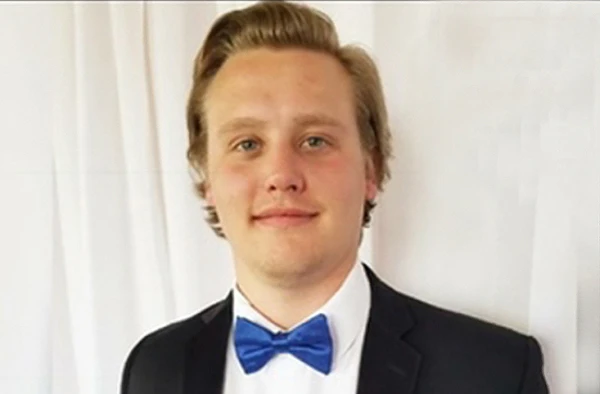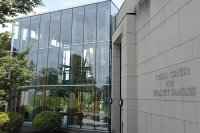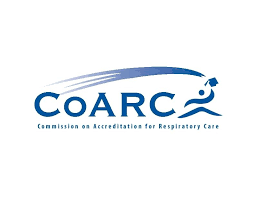Bachelor of Science in Respiratory Therapy (BSRT)
Fully Accredited
Marywood University is accredited by the Middle States Commission on Higher Education (MSHE). / ADDRESS / 3624 Market Street, 2nd Floor West, Philadelphia, PA 19104. | Phone: (267) 284-5000
The Respiratory Therapy Program was awarded initial provisional accreditation in March 2020 by the Commission on Accreditation for Respiratory Care (CoARC). / Program Number: 200639 / View CoARC’s Outcomes »
PROGRAM GOAL / To prepare graduates with demonstrated competence in the cognitive (knowledge), psychomotor (skills), and affective (behavior) learning domains of respiratory care practice as performed by registered respiratory therapists (RRTs). To prepare leaders for the field of respiratory care by including curricular content that includes objectives related to acquisition of skills in one or more of the following: management, education, research, advanced clinical practice (which may include an area of clinical specialization).
The Respiratory Therapy Program was awarded initial provisional accreditation in March 2020 by the Commission on Accreditation for Respiratory Care (CoARC).
“CoARC accredits respiratory therapy education programs in the United States. To achieve this end, it utilizes an ‘outcomes based’ process. Programmatic outcomes are performance indicators that reflect the extent to which the educational goals of the program are achieved and by which program effectiveness is documented.”
Be In Demand with a Respiratory Therapy Degree
Are you driven by a passion to impact lives in the healthcare sector? At Marywood University, our Respiratory Therapy program offers more than just an education; it is a gateway to becoming a pivotal part of the healthcare system. Aspiring professionals like you can thrive in this dynamic field that blends science, technology, and patient interaction in exciting ways.
In our Bachelor of Science in Respiratory Therapy (BSRT) program, you will engage deeply with both the science and the human elements of healthcare. You’ll gain comprehensive knowledge and hands-on experience that seamlessly integrates classroom learning with real-world application. What sets Marywood apart is our commitment to personalized education and cutting-edge facilities. Unlike larger institutions, our focused approach means you receive more one-on-one time with experienced instructors and access to state-of-the-art technology and treatments.
From your first semester, you’ll be immersed in clinical experiences across a range of settings. Marywood has partnerships with seven regional hospitals, providing diverse environments—from neonatal to geriatric care—that prepare you for any challenge in your professional life. These experiences are designed to build your confidence and skills in real-life scenarios, ensuring you are well-prepared for the workforce.
The career outlook for respiratory therapists is exceptionally promising, with a projected 23% job growth from 2016 to 2026. Graduates from our program are recognized for their readiness and adaptability, equipped to select their work settings and patient demographics, tailoring their careers to their passions.

After attending a couple of universities I am so glad I chose Marywood because of the quality of education is outstanding and my professors are extremely knowledgeable, personable, and assiduous!
Matthew Goodrich '23 Read All Testimonials
At Marywood University, we don’t just prepare you to meet the demands of the job market; we prepare you to lead and innovate in your field, making a significant impact on the lives of patients and advancing the practice of respiratory therapy. Join us to step confidently into a career that promises not just growth and variety, but the chance to make a real difference each day in the lives of others.
Key Advantages of Our Respiratory Therapy Program
- Benefit from one-on-one mentorship and small class sizes that ensure you receive the attention and guidance necessary to excel
- Gain hands-on experience in diverse healthcare settings through our partnerships with seven regional hospitals, from intensive care units to pediatric care
- Graduate into a profession where demand is high, with a job growth projection of 23% over ten years, ensuring numerous opportunities in a variety of environments
Outcomes & Opportunities
Top Employers
- Hospitals
- Urgent Care Centers
- Clinical/Doctor's Office
- Military Hospitals
Top Career Paths
- Respiratory Therapist
- Adult Intensive Care Specialist
- Pediatric Respiratory Specialist
- Pulmonary Technologist
Dig Deeper Into the Program Details
If you have any questions about this program, we're here to help.
Undergraduate Admissions Requirements
- Completed application
- Official transcripts
- Letter of recommendation
- Official SAT and/or ACT test scores (Marywood is test optional)
- Essay (optional)
Career Settings
Respiratory therapists provide the hands-on care that helps people recover from a wide range of medical conditions. Therapists get to know their patients, and their patients’ families, and have the opportunity to help them through trying times. Whenever breathing is an issue, they are there.
- In hospitals, giving breathing treatments to people with asthma and other respiratory conditions.
- In intensive care units, managing ventilators that keep the critically ill alive.
- In emergency rooms, delivering life-saving treatments.
- In newborn and pediatric units, helping kids with conditions ranging from premature birth to cystic fibrosis.
- In operating rooms, working with anesthesiologists to monitor patients’ breathing during surgery.
- In patients’ homes, providing regular check-ups and making sure people have what they need to stay out of the hospital.
- In sleep laboratories, helping to diagnose disorders like sleep apnea.
- In skilled nursing facilities and pulmonary rehabilitation programs, helping older people breathe easier and get more out of life.
- In doctors’ offices, conducting pulmonary function tests and providing patient education.
- In asthma education programs, helping kids and adults alike learn how to cope with the condition.
- In smoking cessation programs, assisting those who want to kick the habit for good.
- In air transport and ambulance programs, rushing to rescue people in need of immediate medical attention.
- In case management programs, helping devise long-term care plans for patients.
Respiratory Therapist Job Duties
Here is a list of tasks that Respiratory Therapists do every day.
- Monitor patient’s physiological responses to therapy, such as vital signs, arterial blood gases, or blood chemistry changes, and consult with physician if adverse reactions occur.
- Set up and operate devices such as mechanical ventilators, high flow oxygen, aerosol generators, nitric oxide gas inhalation therapy, and BiPAP/CPAP machines
- Work as part of a team of physicians, nurses, or other healthcare professionals to manage patient care by assisting with medical procedures or related duties.
- Maintain charts that contain patients’ pertinent identification and therapy information.
- Read prescription, measure arterial blood gases, and review patient information to assess patient condition
- Perform arterial blood gas punctures and analyze results
- Are first line responders to emergency situations such as cardiac arrest and code blue situations performing manual ventilation and assist/perform intubations on patients
Ideal Skills for a Respiratory Therapist
Like most jobs in the healthcare profession, respiratory therapists need to have a unique skill set that allows them to multitask while remaining hyper-focused on the needs and conditions of their patients. All respiratory therapists should have the following skills:
- Verbal communication skills
- Calm bedside manner
- Compassion
- Deep understanding of infectious control
- Ability to work with a medical team
- Good judgment and quick decision-making ability
- Time management skills
- Physiological knowledge
- Patience and ability to teach and train patients
- Detail oriented
- Science and math skills
The Respiratory Therapy program is located in the O’Neill Center for Healthy Families. The state-of-the-art facility includes spacious labs with equipment that will be seen in the clinical setting. Students simulate many therapies and use different types of equipment to build confidence before going into the clinical setting. All Respiratory Therapy majors are required to achieve competence in the lab in a controlled environment before going out to the clinical sites with patients. Students perform real simulation situations and activities in the lab, so they will have an understanding of therapeutic concepts and how they are applied in real patient care settings. The simulations prepare our students to treat patients as they begin the clinical portion of the program.

O'Neill Center for Healthy Families
1401 University AvenueMap & Directions
The O'Neill Center for Healthy Families, located on University Avenue, provides classroom and research space, joining academic programs to innovative research. Students from the Nursing, Nutrition and Dietetics, Exercise Science, Respiratory Therapy, and Physician Assistant programs have classes in this building.
Learn More | Take a Virtual Tour

Healthy Families Classrooms
Map & Directions
The O'Neill Center for Healthy Families is the academic home of students in the nursing, nutrition and dietetics, respiratory therapy, and physician assistant programs, all of whom have classes in this building. Exercise Science students also take classes here. The facility includes traditional classroom space as well as clinical and lab space.
Learn More

Center for Natural and Health Sciences
206 Morgan RoadMap & Directions
The Center for Natural and Health Sciences contains various science laboratories, computer labs, the 100-seat Comerford Theatre, and various classrooms. Classrooms for our Math and Computer Science, Science, and Public Administration programs are in this building.
Learn More | Take a Virtual Tour
Scholarships
Morris K. Udall Scholarship
The Udall Foundation seeks future leaders across a wide spectrum of environmental fields, including policy, engineering, science, education, urban planning and renewal, business, health, justice, and economics. The Foundation also seeks future Native American and Alaska Native leaders in public and community health care, tribal government, and public policy affecting Native American communities, including land and resource management, economic development, and education.
Tuition
View Tuition Rates- Department Chair
- Associate Professor of Practice
- ttulaney@marywood.edu
- 570-348-6211 x2455
- Nursing Clinical Coordinator
- Assistant Professor of Practice
- ciesielski@marywood.edu
- 570-348-6275
- Respiratory Therapy Clinical Coordinator
- Instructor of Practice
- sdalton@marywood.edu
- 570-348-6275
- Nursing Academic Success Coordinator
- Nursing LPN to BSN Coordinator
- Instructor of Practice
- daholod@marywood.edu
- 570-348-6211 x2540
- Respiratory Therapy Program Director
- Instructor of Practice
- jvinton@marywood.edu
Clinical Requirements
The following must be completed after a respiratory therapy major has been selected for, but prior to their start in the clinical portion of the program and are also requirements for continuation:
- Physical examination and required immunizations
- Background checks (Pennsylvania Child Abuse History Clearance, FBI fingerprint check, and PA State Police Criminal Record Check)
- Drug screens
The student should consider these factors before enrolling in this program. If the student has any questions regarding this, he or she should contact the program director.
In addition to tuition and fees, students must purchase uniforms, supplies, liability insurance, testing, and clinical parking fees. Students will be assigned computer simulations that will be completed throughout the program. This will prepare students to sit for the National Board of Respiratory Care (NBRC) exams when they have graduated.
Students will also be required to help within the community and gain knowledge outside of the classroom setting by acquiring Professional Development credits. These outside credits could include volunteering at American Lung Association events, attending informational sessions within the community that teach different types of cardio pulmonary disorders and diseases.
Membership in the American Association for Respiratory Care (AARC) is required by the start of the second semester of the clinical portion of Respiratory Therapist program.
Graduation Requirements
Graduation requirements for a Bachelor of Science in Respiratory Therapy include current Certification in American Heart Association BLS (CPR), American Heart Association Advanced Cardiac Life Support (ACLS) certification, American Heart Association Pediatric Advanced Life Support (PALS) certification, professional development credits, and satisfactory performance on comprehensive written, laboratory, simulation, and oral exit examinations.
Acquiring Core Skills
In addition to the clinical skills that students will learn as part of their curriculum, the BSRT program incorporates core skills training into the program that will benefit all Respiratory Therapy students in their careers.
- Writing in the Profession
Students will demonstrate the ability to write effectively in the profession. Elements include the ability to organize an argument, support the argument with high quality relevant evidence, deliver it with good sentence structure and grammar, and cite and reference appropriately. - Oral Communication/Consultative Function/Knowledge
Students will deliver a consultative presentation with recommendations that reflect the knowledge gained through courses in this program. - Critical Inquiry/Evidence-based Medicine
Students will demonstrate the ability to formulate a clinical question, search the medical literature, and assess the collected literature for quality, relevance and limitations. - Teamwork/Interprofessional Cooperation
Students will demonstrate collaboration in interprofessional teams to accomplish a common goal. - Ethical Leadership
Students will demonstrate effectively the ability to lead a group of professionals in an ethical manner promoting patient advocacy. - Teaching Patients and Healthcare Professionals
Students will demonstrate the ability to educate patients, their families, and healthcare professionals.
Request Information
Latest Program News & Events
Admissions Calendar
Fully Accredited
Marywood University is accredited by the Middle States Commission on Higher Education (MSHE). / ADDRESS / 3624 Market Street, 2nd Floor West, Philadelphia, PA 19104. | Phone: (267) 284-5000
The Respiratory Therapy Program was awarded initial provisional accreditation in March 2020 by the Commission on Accreditation for Respiratory Care (CoARC). / Program Number: 200639 / View CoARC’s Outcomes »
PROGRAM GOAL / To prepare graduates with demonstrated competence in the cognitive (knowledge), psychomotor (skills), and affective (behavior) learning domains of respiratory care practice as performed by registered respiratory therapists (RRTs). To prepare leaders for the field of respiratory care by including curricular content that includes objectives related to acquisition of skills in one or more of the following: management, education, research, advanced clinical practice (which may include an area of clinical specialization).
The Respiratory Therapy Program was awarded initial provisional accreditation in March 2020 by the Commission on Accreditation for Respiratory Care (CoARC).
“CoARC accredits respiratory therapy education programs in the United States. To achieve this end, it utilizes an ‘outcomes based’ process. Programmatic outcomes are performance indicators that reflect the extent to which the educational goals of the program are achieved and by which program effectiveness is documented.”




